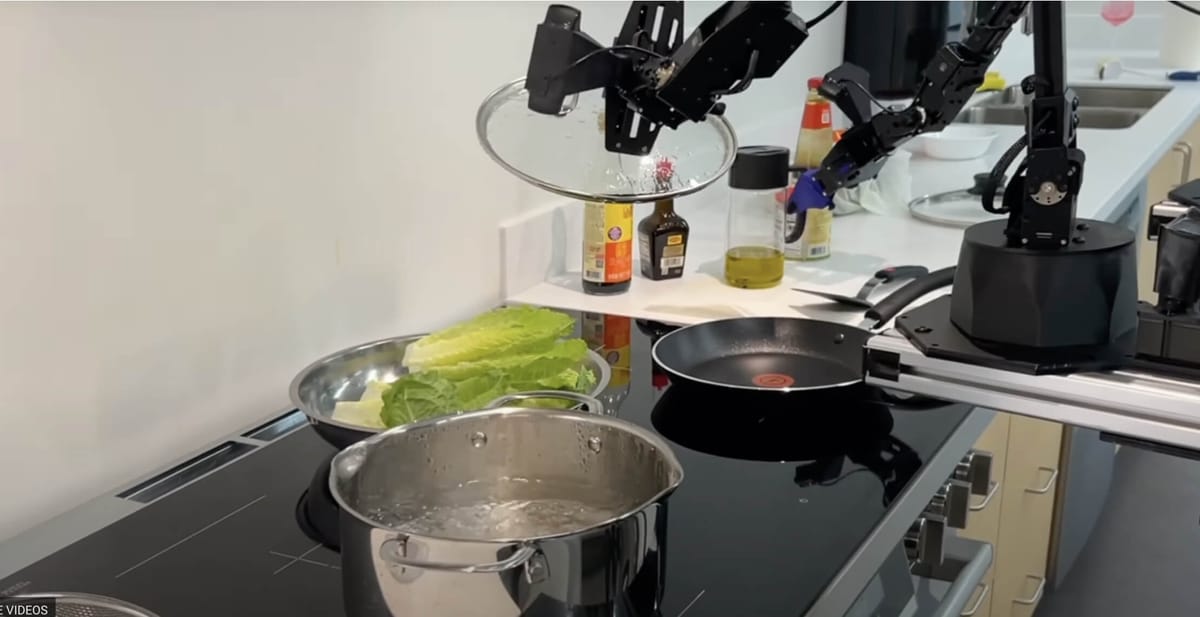
Researchers at Stanford University have developed Mobile ALOHA, an innovative bimanual mobile manipulator that brings advanced mobile manipulation capabilities to a low-cost robotic platform. Built upon the affordable ALOHA (A Low-cost Open-source Hardware) bimanual teleoperation system, Mobile ALOHA incorporates mobility and whole-body control to perform complex real-world tasks like cooking, cleaning and human-robot interaction.
By adding a mobile base, dexterous arms and an intuitive whole-body teleoperation interface, Mobile ALOHA provides researchers an accessible testbed for advancing mobile manipulation. The system costs under $32,000 including onboard power and compute, significantly more affordable than comparable mobile manipulators.
Traditionally, robotics research, particularly in the domain of imitation learning, has been confined to static, table-top manipulations. However, Mobile ALOHA overcomes these limitations by integrating mobility with bimanual, whole-body control.
Mobile ALOHA inherits ALOHA's human-centric design, with backdrivable arms enabling puppeteer-style control of its 14 degrees of freedom. Crucially, Mobile ALOHA allows simultaneous control of the arms, base and wrist cameras via an ergonomic waist tether, collecting seamless whole-body demonstrations.
The key to Mobile ALOHA's design lies in its ability to imitate complex, real-world tasks through supervised behavior cloning. By using demonstrations and co-training with static ALOHA datasets, the system has shown remarkable proficiency in intricate tasks. For instance, it can efficiently execute activities like cooking, navigating elevators, and even housekeeping chores, demonstrating a success rate boost of up to 90% in certain tasks with just 50 demonstrations per task.
The development of Mobile ALOHA addresses two primary challenges in the robotics field. First, the cost barrier: high-quality bimanual mobile manipulators have historically been prohibitively expensive, often exceeding $200,000. Mobile ALOHA shatters this barrier, offering a viable alternative at a fraction of the cost. Secondly, it addresses the complexity of high-performance bimanual mobile manipulation. The integration of imitation learning with a low-cost platform makes Mobile ALOHA an attractive proposition for widespread research and practical applications.
At the heart of Mobile ALOHA's design are four key elements:
- Mobility: Capable of moving at human walking speeds, Mobile ALOHA enhances task efficiency in dynamic environments.
- Stability: It remains stable even when handling heavy objects, a crucial factor in household tasks.
- Whole-body Teleoperation: The system enables simultaneous control of all its parts, providing a seamless user experience.
- Untethered Operation: Its onboard power and compute capabilities free it from external dependencies, increasing its operational range.
Notably, the researchers demonstrate substantial performance gains by complementing the mobile manipulation data with ALOHA's existing static bimanual dataset. Despite significant differences in morphology and tasks, this "co-training" provides useful priors, improving success rates by up to 90% across actions like cooking shrimp, wiping spilled wine, and pushing in chairs.
The study highlights Mobile ALOHA's versatility, compatibility with leading imitation learning algorithms, and ability to complete long-horizon tasks relying on whole-body coordination. Yet it remains accessible even for non-experts, with users reliably achieving expert-level teleoperation proficiency in under 5 trials. Its open source design should empower researchers to further probe the boundaries of dexterous mobility and continue charting a path towards reliable and affordable mobile manipulation.

